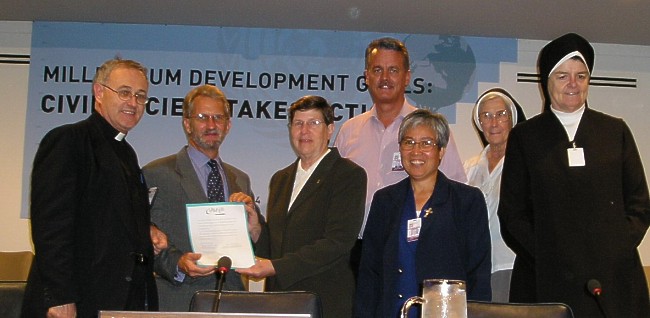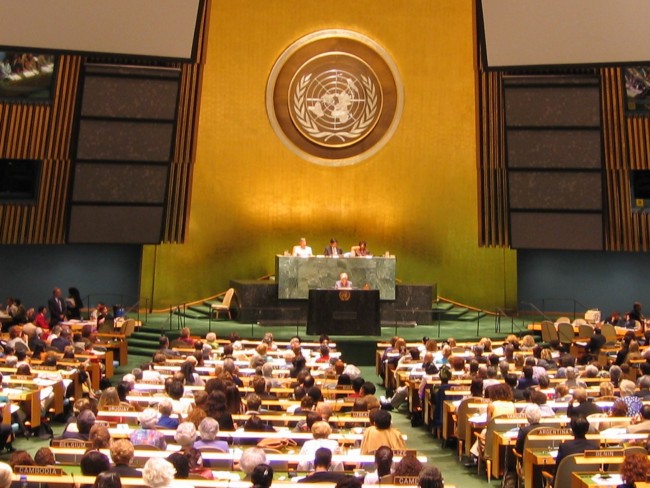|
no. 4 october - december 2004
The only source of water in Zumalai, Timor Leste for a community of 13,000 people and location of a Carmelite parish. The 7th Millennium Development Goal is to "ensure environmental sustainability." One of the targets of this goal is to reduce by half the proportion of people without access to safe drinking water. The Carmelites minister in a parish in Zumalai. (Photo courtesy of the Carmelite Province of Australia and Timor Leste)
The Carmelite NGO and the 57th United Nations DPI/NGO Conference The 57th annual DPI/NGO (Department of Public Information/Non-Governmental Organizations) Conference was held at the United Nations headquarters in New York City on September 8-10, 2004. The theme of the conference was "Millennium Development Goals (MDGs): Civil Society Takes Action." Over 2,700 people participated, representing more than 700 NGOs (of about 1400 affiliated to the UN) from 90 countries. Seven members of the Carmelite Family attended all or parts of the conference. They included three members of the Congregation of Our Lady of Mt. Carmel (Louisiana-USA), one from the Sisters of the Aged and Infirm, two from the Carmelite Order, and one Lay Carmelite. The OCD NGO representative also attended the conference and met with the OCARM representatives. The Millennium Development Goals are an ambitious agenda for reducing poverty and improving lives around the world, agreed on by all 189 UN member states at the Millennium Summit in September 2000. For each of the eight goals one or more targets have been set, most for 2015, using 1990 as a benchmark. Funding would come from a UN target of 0.7% of Gross Domestic Product (GDP) for overseas development by the richer nations. In a taped video speech to the assembly, Secretary-General Kofi A. Annan told participants that there is no time to lose in ending extreme poverty and putting the world on a more humane and just path. He highlighted that people everywhere wanted a fair chance for themselves and their children. If the MDGs were not met all of the world’s inhabitants would be poorer.
With formalities completed, the members set to work on 5 objectives: (1) what the goals are; (2) the current status of their implementation; (3) addressing of obstacles to them; (4) the sharing of innovative approaches to partnerships to achieve them; and (5) civil society’s (NGO) responsibility to generate broad public awareness and support for the goals. This is all in preparation for a five-year review, to take place in September 2005, of progress towards achieving the Millennium Summit’s objectives. This year, portions of the three day conference were webcast live around the world on an interactive United Nations web site. For more details on the DPI/NGO conference, read the October issue of the Global Network for Justice Bulletin [vol. 4 no. 2], accessible at carmelites.info/ngo (Above) Some of the 130 children in one classroom with more at the windows at the Carmelite parish primary school in Zumalai, East Timor. Millennium Development Goal #2 is to "achieve universal primary education" with the target of 2015 that all boys and girls complete primary school. (Photo courtesy of the Carmelite Province of Australia and Timor Leste)
Linking the Millennium Goals to Our Current Ministries In reality, our Carmelite NGO is just beginning to generate awareness of the Millennium Goals among the members of the various branches of the Carmelite Family. This issue of CITOC focuses on the conference and the goals. The Carmelite NGO website, in the three official languages of the Order, already has a fairly complete set of links for the MDGs. Unfortunately, most of the information supplied by the UN is only in English. It is hoped that editors of Carmelite magazines and bulletins will make these resources available to their readers. A new initiative of the Carmelite NGO will be the "NewsBriefs" email bulletin which will begin by Christmas 2004. This electronic bulletin, which will initially be sent to everyone on the CITOC-online mailing list, will list various initiatives and information resources of use to Carmelites in their ministries and personal reflections. (see article)
It will also be helpful for the theologians as well as those working in the various justice, peace, and integrity of creation initiatives in our Provinces and Congregations to help connect us to the goals. Others in ministries which are addressing the Millennium Development Goals should not be shy about letting others know about their work. For example, during the UN conference, Mozambique was held up as one country which has made significant progress towards achieving the Millennium Goals. Perhaps Carmelites in other areas could benefit from hearing about the Mozambique experience from our brothers and sisters there. As is almost universally admitted, the Millennium Development Goals are quite ambitious. The target for .07% of some nations Gross National Product to fund these initiatives is also just as ambitious. (Above) Some of the representatives of the Carmelite NGO and the OCD NGO, following the opening session of the 57th Annual NGO/DPI Conference, pose in the General Assembly Hall (CITOC photo)
Carmelite Family Key to Carmelite NGO
Presentation of the Carmelite document to Paul Hoeffel, Chief, NGO Section of the Department of Public Information of the UN, "recommitting ourselves to pursue justice and peace for all." The Carmelites are (l-r) John Sullivan, OCD, Jane Remson, OCarm, William J. Harry, OCarm, Helen Ojario, OCarm, Clare Cramer, OCarm, and Marcella Bean, OCarm. The document was signed by both Joseph Chalmers, Prior General of the Carmelites and Luis Aróstegui Gamboa, General Superior of the Discalced Carmelites. (Photo by CITOC) Since the month of May there have been several gatherings in connection with the Carmelite NGO. Three of the meetings took place in Rome and one in New York at the United Nations itself. On May 19, two representatives of the Carmelite NGO made a full day presentation at the meeting of the Superior Generals of those Congregations and Institutes affiliated to the Order and which make up what is called "The Carmelite Family." It was during this group’s previous meeting that the idea of the Carmelites affiliating themselves to the Department of Public Information (DPI) of the United Nations as an NGO began to gain momentum. Ursula Diasselliss, O. Carm., President of the Congregation of Our Lady of Mount Carmel, which is the congregation which actually holds the accreditation to the United Nations and William J. Harry, O. Carm., General Councilor for Communications and one of the representatives to the DPI/NGO of the United Nations, spoke about the development of the Carmelite NGO as a project of the Carmelite Family. They explained what role the Carmelite NGO currently has in the UN with its affiliation to the Department of Public Information. The second part of the presentation included various Congregations presenting a justice and peace initiative that they are involved in. Within the projects already underway, the third part of the presentation was a presentation of possible models for the Carmelite NGO in the future. The final presentation was on the concrete steps that need to be taken in order for the Carmelite NGO to grow and develop. The desire is to move to the next level of affiliation with participation in the Economic and Social Council (ECOSOC). On May 21, a meeting was held at the Curia in Rome with members of the Order’s International Justice and Peace Commission and representatives from the Carmelite NGO to plan out future steps. On May 22-23, a group of NGOs in some relation to the Order met at CISA in Rome to organize cooperative efforts in international initiatives that already exist. Present at the meeting were representatives from the Associazione P. Carlo Colelli (Italy), the Carmelite Missionary Sisters of St. Thérèse of the Child Jesus (Italy), Global Network for Justice (USA), Karit: Solidários por la Paz (Spain), the Provincial Commissariat of the Congo, FIDOC (Netherlands), Rainer Fielenback (GerS), members of the International Justice and Peace Commission and the Carmelite NGO. During this meeting, each NGO explained some of their history and their current efforts in the area of justice and peace. How the Carmelite NGO could assist them in their work was also discussed. Another similar meeting of those Carmelite related NGOs in the Asia area is scheduled for late February of next year. (More information on this meeting will be posted on the Carmelite NGO website as it becomes available: carmelites.info/ngo) Representatives of the Carmelite NGO met again in New York at the headquarters of the United Nations to take part in the annual DPI/NGO Conference in September (see main article).
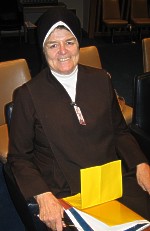 NGO Becomes a Ministry of the Carmelite Family NGO Becomes a Ministry of the Carmelite FamilyAn Interview with Sr. Marcella Bean, O. Carm. Sr. Marcella Bean, O. Carm., of the Carmelite Sisters of the Aged and Infirm, has been a social worker for 37 years. She is currently on staff at St. Patrick’s Home in Bronx, New York, in the shadow of Yankee Stadium, home of the famous American baseball team. St. Patrick’s Home has 264 residents. Sister works on the unit which is home to patients with dementia. The Carmelite Sisters for the Aged and Infirm were founded in 1929 in the Bronx. They affiliated to the Carmelite Order two years later. The Congregation has over 240 sisters. Today the Congregation has 28 residences for the elderly in the USA and one south of Dublin, Ireland. Some residences provide residential care. Others are campuses providing elderly with care ranging from independent living to full time care. How did you get involved with the Carmelite NGO? A couple of years ago, I happened to meet Sr. Ursula Diasselliss (Superior General of the Congregation of Our Lady of Mount Carmel) at our Mary Manning Walsh Home in Manhattan, New York. She was staying there while attending some meetings at the UN. So I went in to meet her and we started talking about the UN. My antennae went up because it seemed like a natural fit for us Carmelites. In fact, I was floored when I ran into all the other religious sisters at UN meetings I have attended. Many people express reservations about the UN and our involvement in it. Why do you think it is natural we would be involved? Yes. I have heard people say that the UN is pro-abortion as well as other things that we would not support. But I do not think those who say that understand what the UN or the NGO is all about. The United Nationes is certainly a place we need to be as we have always been on the side of the emarginated, the poor, and people in need. You meet all of those people and you certainly are confronted with their issues at the UN. What are some of the justice and peace initiatives your Congregation is involved with? Really anything to do with the respect for life—the fight against euthanasia and population control. We are always on the lookout for the abortion issue. We work with a variety of groups in our homes and this means we have to be aware of the issues with each. For example, our workers are part of labor unions. We make sure that our workers are paid a just wage. We have people coming to us from parishes, and we deal with many members of the clergy and a large group of volunteers. With each we try to give witness that life matters. What has been your involvement with the Carmelite NGO? For several years I became exposed to the UN through the National Association of Social Workers (NASW). UN Day also sponsored social workers for international care and for the elderly. The NGO invited me to their meetings through the Carmelite sisters in Louisiana. The meetings addressed world hunger and poverty and aging. My self awareness as a Carmelite Sister has been deepened and my awareness of the acute hunger and worldwide suffering as well. What other involvements have you had? Claire Horn and I were invited to attend a UN conference. I work with Claire in my job as a social worker. This was an international conference to discuss issues regarding the elderly. We were a group of perhaps 30 people from around the world. Lots of issues were discussed—euthanasia, food, clothing, health care availability, where elderly are respected and where they are not—all with the focus being on the elderly. How has your participation in the Carmelite NGO affected you personally? It has made me more aware of the world and our interconnectedness. It can really deepens one’s prayer life. We just cannot be passive in the face of so much tragedy. Such presence in the world situation is what Carmel has been about isn’t it? I am not a superior. I deal with health care, death and dying. I go to the United Nations to focus on the wider world, to educate myself about what is going on. We Carmelites have to be there (at the UN). Meeting these real situations deepens one’s spiritual life.
Some of the more than 2,700 representatives from over half of NGOs accredited to the United Nations at the first session of the 57th United Nations DPI/NGO Conference on September 8, 2004. The first session is traditionally held in the General Assembly Hall, a very familiar site to most people. (CITOC photo) "News Headlines" to Bring News of Carmelite NGO to Members of the Carmelite Family A new initiative of the Carmelite NGO will be an electronic news bulletin sent to any member of the Carmelite Family or others who wish to receive the email. The mailing list will begin with anyone currently receiving CITOC-online plus those who are on supplemental mailing lists maintained at the Curia. Each bulletin will contain short pieces of information about current topics in justice and peace and in particular the Carmelite NGO. A link will be provided allowing readers to obtain additional information if they choose. Initially the bulletin will be sent out in the three official languages of the Order each month. Each bulletin will contain a link allowing people to delete their names from the mailing list. For more information or to sign up for "News Headlines," see carmelites.info/ngo |
||
|
RETURN TO THE INDEX FOR 2004 | RETURN TO THE INDEX FOR THIS ISSUE INDEX OF CARMELITE
WEBSITES |
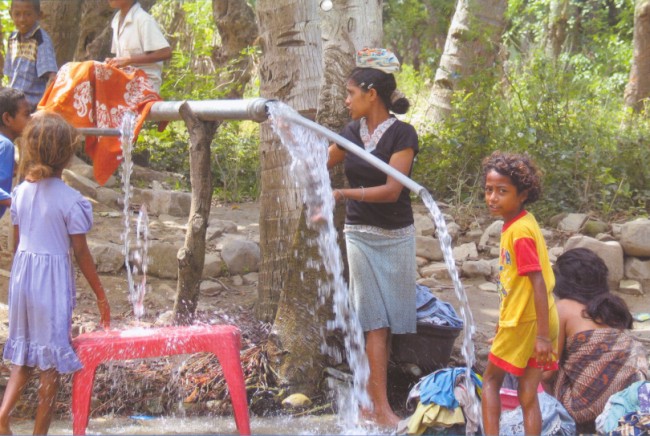
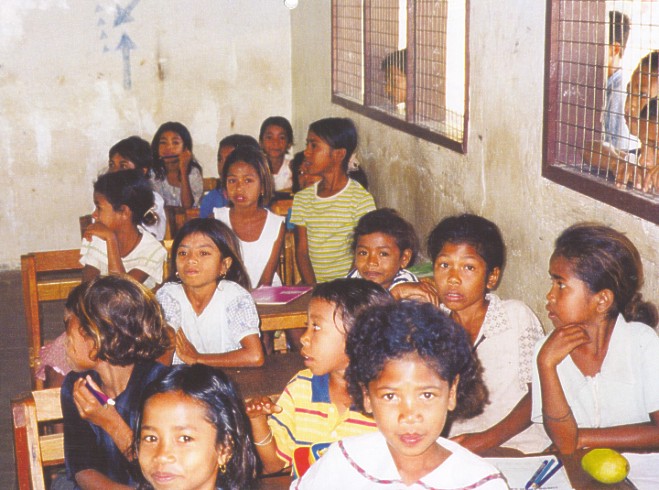 Mr. Annan also spoke highly of the NGOs contribution to the MDGs. They
had put pressure on governments to deliver on their commitments and had
brought real change into people’s lives, he said.
Mr. Annan also spoke highly of the NGOs contribution to the MDGs. They
had put pressure on governments to deliver on their commitments and had
brought real change into people’s lives, he said.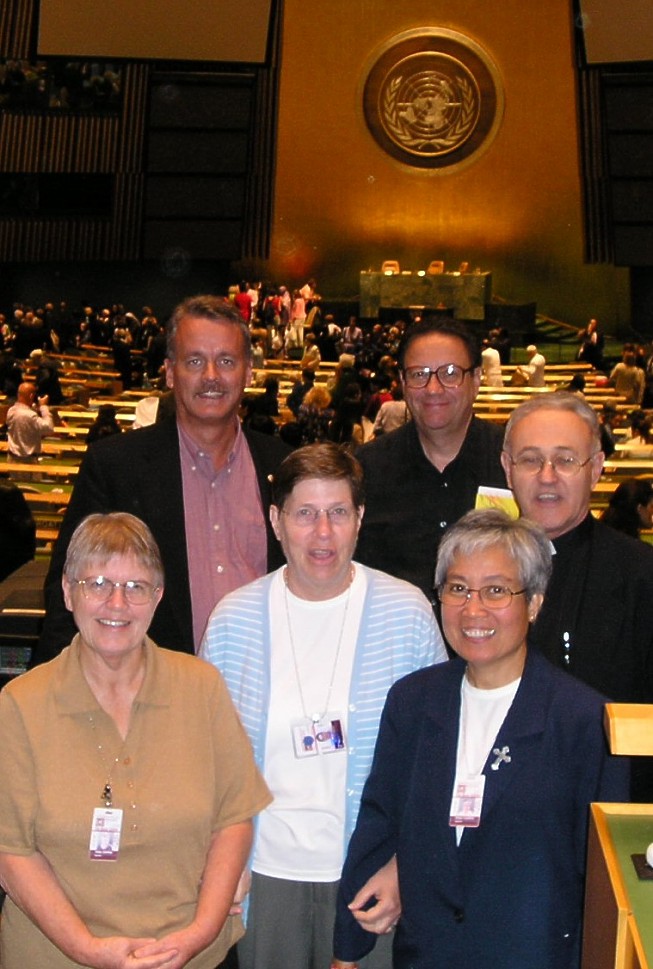 However it is clear that most of the goals have a direct connection to
the work of Carmelite men and women throughout the world. It should be
noted that wealthier countries are increasing their funding for projects
that help achieve a goal. It will be worthwhile for Carmelites in the
various countries to be aware of these goals and the funding assistance
that may be available through partnerships with other NGOs in their area.
However it is clear that most of the goals have a direct connection to
the work of Carmelite men and women throughout the world. It should be
noted that wealthier countries are increasing their funding for projects
that help achieve a goal. It will be worthwhile for Carmelites in the
various countries to be aware of these goals and the funding assistance
that may be available through partnerships with other NGOs in their area.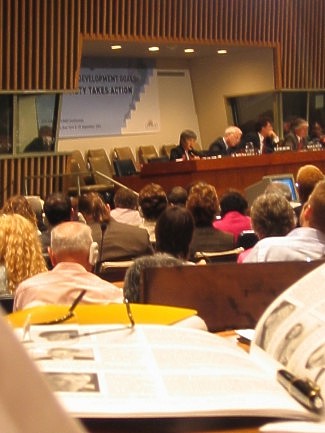 Do We
Have A Place At The Table?
Do We
Have A Place At The Table?